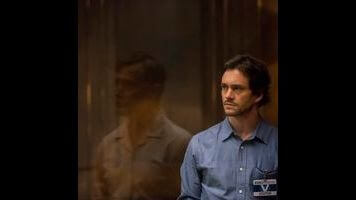“The Wrath of the Lamb” was an episode entirely of subverted expectation. From the opening scene where Francis Dolarhyde pretends to kill himself, to the ending fight scene, this was not the episode I expected. But what is expected in the world of Hannibal, where those who are supposed to die regularly come back to life to fight anew? Will should not have had the strength, after being stabbed in the face and the chest, to take on Francis Dolarhyde, even with Hannibal’s help. With Francis “stronger” than the Dragon, they had to defeat him. He was no longer Hannibal’s to play with, and by extension, he was no longer Will’s to manipulate either. He did not fit into their design anymore.
What was truly incredible about this episode, with all of its ending and finality, is how it pointed to the future. As a prisoner in source of The Red Dragon and the beginning of Silence Of The Lambs, Hannibal is terrifying because of reputation. In Hannibal, we had the benefit of seeing how truly frightening he can be in practice. Even then, his killing are often done with a hint of humor or irony, and his manipulation done out of love and compassion for Will. In “The Wrath Of The Lamb,” it was the first time he got to be truly terrifying from behind glass, the first time in confinement that he did not look upon his visitors with bemusement as if they he was the one on the outside. “You died in my kitchen, Alana, when you chose to be brave,” he says as Alana explains the FBI’s plan. “Every moment since is borrowed. Your wife, your child, they belong to me. You made a bargain for Will’s life and I spun you gold.” Just the thought of Hannibal convinces Bedelia to amputate and cook her own leg (“I’d pack my bags Bedelia,” Will says, making matters worse, “meats back on the menu”), waiting in, breast heaving, with anticipation for Hannibal’s arrival that may never come.
Think about where this season began — with Hannibal free, and Bedelia his prisoner — and where it ended — with Hannibal free, and Bedelia still his prisoner, if only in her mind. For 13 episodes, it covered an incredible amount of ground. Yet, it never felt as it if there was some missing piece. In The Red Dragon source, much is made of Francis Dolarhyde’s backstory, where he came from and how he got to his becoming. His job his a large part of who he is and he’s killed. These details are briefly mentioned, but never explored. Yet, Francis Dolarhyde never felt like only half a character to me, nor did his story feel unfinished. The parts of Dolarhyde that were not extrapolated on were made up for in the central dynamic between Will and Hannibal. They filled any gaps Dolarhyde’s character might have had. Part of Hannibal’s greatness is that these secondary characters are put in place not to tell their own stories, but to augment Will and Hannibal’s. The other part of that greatness is those second characters don’t feel lesser because of the purpose they serve.
While I hope it is not the last we see of Hugh Dancy as Will Graham and Mads Mikkelsen as Hannibal Lecter, it likely is all the same. But “The Wrath Of The Lamb” acted as a perfect finale for these two characters. Hannibal won’t get out to act out his most famous legend, with Clarice Starling and James Gumb. Instead, he ends his time on screen in a way that none of us would have expected when this show began: In the arms of the man he loved.
Stray observations
- Recipe of the week: Curry Dragon Bowl (unlike the other recipes I’ve shared, I’ve actually made this one and it’s really good)
- The staging of this episode was exquisite. The juxtaposition of faces has been on point this season as a whole (i.e. in the way that faces are reflected in the glass), but it bears repeating, this one of the more interestingly directed shows on TV.
- Spin off starring Scott Thompson and Aaron Abrams as goofy lab techs?
- “You righteous, reckless, twitchy little man. You might as well cut all of our throats and be done with it.” Bedelia wins the award for best addition to season three.
- The Hannibal Lecter School of Sick Burns: “If you see him, tell him I wish him a speedy recovery and I hope he is not ugly.”
- Lemme get sentimental for a sec: It has been truly wonderful and incredibly challenging to write about this show week after week. Sometimes, it was all laid out so clearly, other times I honestly had no idea what the fuck was going on, but still enjoyed the hell out of it nonetheless. I hope you enjoyed reading.









































